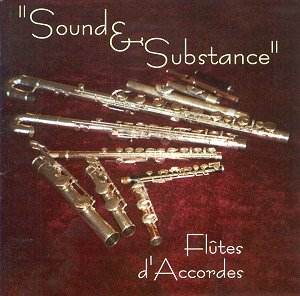The driving force behind this release is the
flautist Ann Cherry who asked several British composers to compose
works for the still fairly unusual medium of the flute quartet.
True, there already exists a limited, but sadly neglected repertoire
for flute quartet, of which a few examples come to mind: Meriläinen’s
Mouvements circulaires en douceur, Gubaidulina’s
Flute Quartet, some pieces by the
Frenchman Eugène Bozza and Victor Legley’s Flute
Quartet Op.14, Arthur Meulemans’ Andante en Scherzo,
Peter Cabus’s Flute Quartet, Frits Celis’s Notturno
e Danza Op.12 as well as several works for multiple flutes
by Joseph Jongen, to mention but a few Belgian composers who wrote
for the medium.
In commissioning the works recorded here, Ann
Cherry clearly wanted "to demonstrate the importance of the
flute quartet as a performing medium ... and to demonstrate the
excellence and variety of British composers". I must confess
that all composers here, but one, are completely new to me (and
I was delighted and amused to read that Paul Farrer did the music
for The Weakest Link!). Daryl Runswick, whose music is
also new to me, was a comparatively familiar name. All works,
but the concluding one by Stephen Deutsch, are actually for flute
quartet, though in varying settings. The pieces by McGarr, Toon
and Farrer are scored for ‘normal’ flute quartet (i.e. two C flutes,
one alto flute and one bass flute) whereas Runswick’s work is
for four C flutes. Deutsch’s piece, of which more later, stands
clearly apart.
The opening item Fieldthread, by
Peter McGarr is a short suite of four colourful and impressionistic
miniatures played without a break. The evoke some particular or
fragile moments in a garden’s life, such as a cobweb, the misty
morning haze before sunrise or the birds’ dawn chorus, all neatly
characterised in these vivid vignettes. An enjoyable recital opener
in any case.
Christopher Toon’s Alice ’98, written
to mark the centenary of Lewis Carroll’s death in 1898, is by
far the most ambitious work here. Its seven sections, in turn
dreamy, lyrical or mildly ironic, play without a break in a colourful,
kaleidoscopic manner. These sharply contrasted mood sketches are
often imbued with refreshing tongue-in-cheek humour, reflecting
Carroll’s own humorous allusions to period pieces "quoted
from memory, therefore misquoted" (the composer’s words)
which surface here and there with telling effect. A thoroughly
delightful and enjoyable work, if a bit too long for its own good.
Paul Farrer’s Flute Quartet No.1 "Two
English Seasons" is on the whole fairly traditional
(i.e. in 20th Century terms) although it allows for
some freedom in matters of dynamics and expression, which are
left at the players’ choice.
As already mentioned, Runswick’s Flutz
for four C flutes is a semi-improvised canon, also leaving matters
of dynamic and expression to the players, much in the same way
as in Farrer’s First Quartet, although players are obviously given
more freedom. It is written in a somewhat more advanced, though
in no way rebarbative, idiom. There is a real sense of fun in
what the composer aptly describes as an "anything-might-happen
roller-coaster". This must be fun to play.
Stephen Deutsch’s The Windows in Ann’s
Flute is somewhat different from the other works. The
basic notated material (played here by Susan FitzGerald) was recorded
first. The recording was then reworked and electronically re-processed
in the composer’s studio. The studio work, however, was most sensitively
done and the end result is an often beautiful meditation in which
a basic melody is repeated several times within a slightly different
sound context, some sort of Answered Unanswered Question.
The answer comes in the form of quotes from Bach’s music played
by Ann Cherry. While listening to it, I kept thinking in orchestral
terms. I can imagine the composer eventually scoring it for strings
and percussion (and maybe a few brass brought in for good measure).
Well, yes, you guessed it: I liked this very much.
Flûtes d’Accordes (six brilliant
flautists joining for the occasion) clearly believe in this programme
and play most convincingly throughout. So, in short, a most interesting
and welcome release exploring some unfamiliar repertoire for a
fairly unfamiliar medium, hopefully paving the way for further
original flute quartet music.
Hubert Culot
